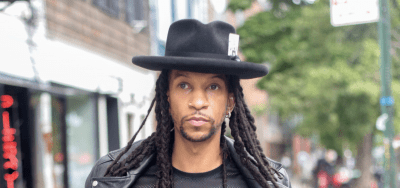Photo illustration by Johansen Peralta
Don’t put Xenia Rubinos in red
Rubinos joins 'Brooklyn Magazine: The Podcast' to discuss her new album—and dealing in identity politics without being overtly political
Like what you’re hearing? Subscribe to us at iTunes, check us out on Spotify and hear us on Google, Amazon, Stitcher and TuneIn. This is our RSS feed. Tell a friend!
Xenia Rubinos gleefully defies categorization. The Brooklyn-based keyboardist and vocalist’s compositions reflect an almost omnivorous curiosity: The music is rhythmically and melodically complex, infusing elements of funk, rock, hip-hop, jazz. It can be operatic, grungy, beautiful, weird.
“I’ve never been doing a straight-ahead rendition of anything,” she says. “Every genre or style is contaminated with everything else.”
To use her word, Rubinos’ last album, 2016’s “Black Terry Cat,” was something of a contamination hub, a breakthrough record earning her comparisons to Esperanza Spaulding, St. Vincent and, one of her own idols, jazz singer Abbey Lincoln. Standout tracks include “Mexican Chef” which has fun pointing out that in any given Nouveau American—or French or Italian or you-name-it—restaurant, there’s someone of Latin or Hispanic extraction working hard behind the scenes. “It’s a party across America, Bachata in the back,” Rubinos sings. On “See Them” she observes: “You know where to put the brown girl when she’s fuckin’ it up. Where you gonna put the brown girl now she’s tearin’ it up?”
But slow down before you put her in a box.
“I would strike the word ‘political’ from all of my work,” says Rubinos, who is this week’s guest on “Brooklyn Magazine: The Podcast.” “I tend to be put in a political or protest song category at times just because of the subject matter of some of the songs or lyrics that I’ve shared. But I wouldn’t say that’s a central piece that’s present all over my work.”
Born in Hartford, Connecticut to a Puerto Rican mother and a Cuban father, Rubinos does occasionally sing in Spanish and frequently takes on issues of identity in her music, but doesn’t love it when her work is pigeonholed. And yet, the media craves categories.
Now, Rubinos is set to release a new album, her third, which is out this week. “Una Rosa” will drop on October 15 on the Anti- label and it remains is just as gleefully resistant of labels of most of her output. She says she wants it to be “a record that you want to come back to, or when you do come back to, it surprises you,” she says. “Like, ‘Oh I didn’t hear that the last time.’”
Since last year she’s put out six songs (along with elaborate videos for several) in the run-up to the album. “Did My Best,” which deals with sudden loss, came out in March. “Working All the Time” dropped in July: “You better keep me poor and busy/Or I’ll be a danger/The truth is I’m a threat/And it’s got you upset,” she sings. Last year she released “Who Shot Ya,” a nod to Biggie that references the Breonna Taylor murder by police. Three weeks ago she released “Don’t Put Me in Red,” another identity song, which chastises lighting engineers at clubs who would default to putting her in a red spotlight for some reason.
But don’t call her “political.” The music is more than politics. And it’s more than identity. It’s about a shared humanity on the one hand, and Rubinos’ own individuality on the other. And as such it is deeply resonant.
“I shy away from using that word,” she says. Political: “It can be a bit reductive—or put me in a lane that may disappoint folks.” Just being alive in 2021 can feel like a political act in itself. Rubinos is simply providing her own soundtrack.
You might also like 


























